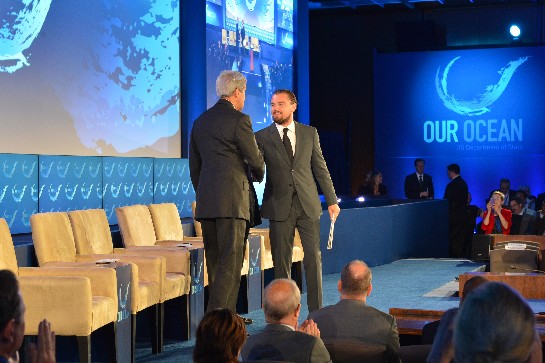
Ocean Acidification Discussed at Our Oceans Conference
With temperatures expected to rise up to six degrees Celsius by the end of the century, increasing global attention is paid to how carbon dioxide affects our climate. It is an accepted fact in the international scientific community that the more of this greenhouse gas there is in the atmosphere, the hotter the planet will be.
Yet, as Carol Turley of the Plymouth Marine Laboratory explained to the participants of the Our Oceans conference at the State Department Tuesday morning, only about half of carbon dioxide emissions enter the atmosphere. The oceans absorb the rest, causing a chemical reaction that results in ocean acidification. According to Turley, rapidly falling pH levels will result in 100-150% greater ocean acidity by 2100.
Ocean acidification was the primary issue discussed on the second day of the Our Oceans conference, hosted by Secretary John Kerry at the State Department in Washington. Tuesday’s proceedings opened with President Obama’s taped announcement of the creation of the world’s largest marine sanctuary in the Pacific Ocean, which received great applause.
Secretary Kerry then introduced guest speaker Leonardo DiCaprio, a passionate supporter of environmental causes through his personal foundation, who delivered a rousing call to action. “We cannot afford to be bystanders in this pre-apocalyptic scenario,” the actor said: “We have to be the catalysts for our own planet’s salvation.”
After the speech, the day’s main panel on acidification began, moderated by Scott Doney of the Woods Hole Oceanographic Institution. Various experts from across the globe presented their data and personal experiences on this pressing climate issue.
Ove Hoegh-Guldberg of the University of Queensland discussed the impact of acidification on coral reefs, juxtaposing an image of a healthy reef with a photo of a reef after Carbon Dioxide levels reach 500 ppm. Phillip Williamson of the Natural Environment Research Council explained the variability of ocean acidity and argued for a coordinated global effort to facilitate greater understanding of the important issue.
The panelist’s most passionate speaker was a recently graduated Davidson student, Alexis Valauri-Orton, who travelled to coastal communities in places as diverse as Norway, Thailand, and Peru through her Watson Fellowship. She detailed the scallop-based economy of a small Peruvian community, and explained how the community would suffer if their scallops failed to thrive as a result of a lack of calcium carbonate, the material from which shellfish build their shells.
Finally, Bill Dewey of Taylor Shellfish Farms in Shelton, Washington, spoke about how ocean acidity affects his oyster fishery. In the first 48 hours of an oyster’s life, he explained, 98% of its weight gain goes to its shell. But with reduced calcium carbonate, oysters have to allocate more of their energy to shell growth instead of strengthening their feeding organs, resulting in a weaker catch.
Secretary Kerry then took the podium for a segment focused on the formation of action steps relating to ocean issues, along with the President of Palau; the Foreign Ministers of Chile, Norway, and Togo; and the Managing Director of the World Bank. President Tommy Remengesau, one of Time’s Heroes of the Environment, declared a new 193,000 square mile marine sanctuary, which will protect an area about the size of Texas in the Pacific Ocean. Borge Brende, the representative from Norway, pledged $150 million of his country’s funds to promoting sustainable fishing practices.
In conjunction with these major action steps, political and charitable leaders in the audience were inspired to make their own pledges: the Ocean Foundation and NOAA pledged to help set up a global ocean acidification network while The Bahamas’ minister of the environment committed his country to protecting 20% of its sea territory by 2020.
Kerry concluded the final group session with an announcement that the conference resulted in pledges of $1.45 billion and an eloquent speech about the need for action.
All in all, the conference demonstrated the kind of productive action that results when people stop debating scientific certainties and focus on real solutions. When political, economic, scientific, and philanthropic leaders come together to share their ideas and perspectives, real change can take place. The Our Oceans conference’s mission is closely aligned with the American Security Project’s; to solve our pressing climate issues, it is imperative that we bring together people from all segments of society and then take action.






[…] Ocean Acidification Discussed at Our Oceans Conference Will Field Ocean acidification was the primary issue discussed on the second day of of the Our Oceans Conference, hosted by Secretary John Kerry at the State Department in Washington. […]